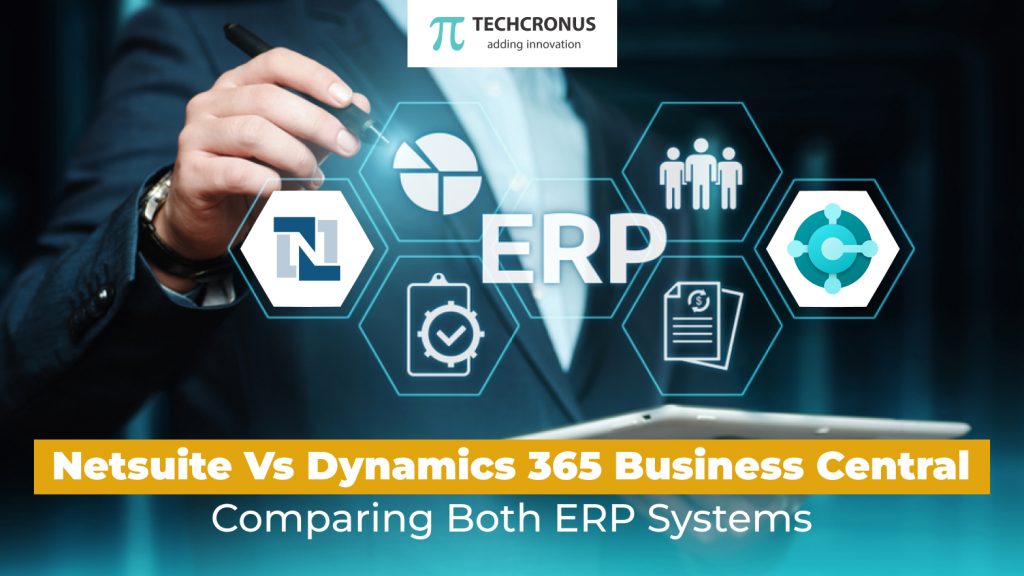ERP Comparison: NetSuite vs. Dynamics 365 Business Central
NetSuite and Dynamics 365 Business Central are both popular cloud-based ERP (Enterprise Resource Planning) systems. Both solutions offer a suite of tools for financial management, customer relationship management, supply chain management, and more. Here are some key differences between the two:
- Company Size: NetSuite is generally considered better for larger businesses, while Dynamics 365 Business Central is designed for small to medium-sized businesses.
- Customization: NetSuite offers greater customization options, but Dynamics 365 Business Central is more user-friendly.
- Pricing: NetSuite’s pricing structure can be complex and is generally more expensive than Dynamics 365 Business Central, which has a more straightforward pricing structure.
- Integration: NetSuite integrates well with other Oracle products, but Dynamics 365 Business Central integrates well with other Microsoft products, including Office 365.
- Industry focus: NetSuite has a wider range of industry-specific solutions, while Dynamics 365 Business Central is more focused on manufacturing, distribution, and retail.
- Reporting: NetSuite has more advanced reporting capabilities, but Dynamics 365 Business Central offers a more intuitive reporting interface.
Microsoft Dynamics 365 Business Central
- Microsoft Dynamics 365 Business Central is an all-in-one cloud-based ERP (Enterprise Resource Planning) solution designed for small to medium-sized businesses. It offers a range of tools for financial management, inventory and supply chain management, customer relationship management, project management, and more.
- Financial Management: Business Central provides comprehensive financial management tools, including general ledger, accounts payable and receivable, cash management, fixed assets, and financial reporting.
- Inventory and Supply Chain Management: Business Central includes tools for inventory management, order processing, purchasing, and supply chain analytics.
- Customer Relationship Management: Business Central offers customer relationship management (CRM) tools, including sales management, marketing campaigns, and service management.
- Project Management: Business Central includes project management tools such as resource management, project costing, time and expense tracking, and invoicing.
- Integration: Business Central integrates well with other Microsoft products, including Office 365, Power BI, and Azure.
- Artificial Intelligence: Business Central uses artificial intelligence (AI) and machine learning to provide insights and automate tasks, such as forecasting demand and detecting fraud.
NetSuite
- NetSuite is a cloud-based ERP (Enterprise Resource Planning) software solution that provides businesses with a comprehensive suite of tools for financial management, inventory and supply chain management, customer relationship management, and more. It was founded in 1998 and acquired by Oracle in 2016.
- Financial Management: NetSuite offers a range of financial management tools, including general ledger, accounts payable and receivable, cash management, fixed assets, and financial reporting.
- Inventory and Supply Chain Management: NetSuite includes tools for inventory management, order processing, purchasing, and supply chain analytics.
- Customer Relationship Management: NetSuite provides customer relationship management (CRM) tools, including sales management, marketing campaigns, and service management.
- E-commerce: NetSuite offers e-commerce capabilities, including website design and management, online sales, and customer self-service portals.
- Customization: NetSuite is highly customizable, with the ability to create custom workflows, forms, and reports.
- Cloud-Based: NetSuite is a cloud-based solution, which means that it can be accessed from anywhere with an internet connection.
Which is Better, Dynamics 365 Business Central or NetSuite?
- Determining which is better between Dynamics Business Central and NetSuite depends on your business needs and requirements. Both solutions are powerful cloud-based ERP systems that provide businesses with a range of features and benefits.
- Dynamics Business Central is a good option for businesses that use other Microsoft products and want an all-in-one solution that integrates well with other Microsoft tools. It also offers advanced artificial intelligence (AI) and machine learning capabilities that can provide valuable insights and automate tasks.
- On the other hand, NetSuite is a highly customizable ERP solution that offers a range of features for financial management, inventory and supply chain management, and customer relationship management. It is a good option for businesses with complex financial needs and those that require advanced customization options.
- Ultimately, the best solution for your business will depend on your specific needs, budget, and resources. It’s important to evaluate both Business Central and NetSuite and consider factors such as features, customization options, ease of use, and pricing before making a decision. It may also be helpful to consult with a trusted ERP consultant or vendor to determine which solution is the best fit for your business.
Conclusion
We are the premier Microsoft Dynamics 365 Business Central experts in Melbourne, Australia. Do you think MYOB, Xero, or Quickbooks are no longer able to meet your business ’ needs? At Techcronus, we partner with local small-to-medium businesses to provide ERP solutions, from consultation to customized solutions. Whether it’s to improve specific performance metrics, reduce dissatisfaction and improve efficiencies in business transactions, support your company’s growth, or save long-term costs, our expert team of local specialists will work closely with you and your business to give an excellent and cost-effective value for ERP software in Melbourne Australia.
